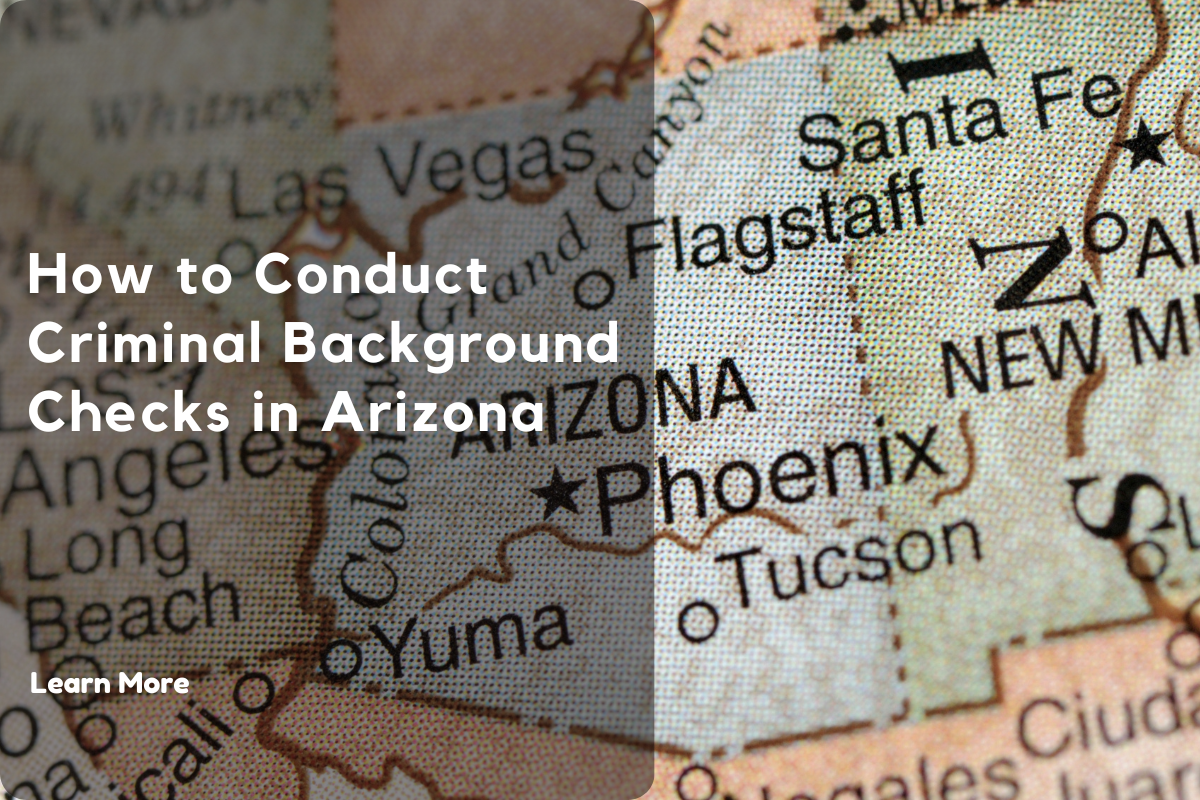 Introduction to Criminal Background Checks in Arizona
Introduction to Criminal Background Checks in Arizona
Criminal background checks are essential in today’s hiring process, as they help employers make informed decisions about potential employees. In Arizona, criminal background checks are crucial to ensuring the safety of the workplace and maintaining compliance with state and federal regulations. Employers, especially those in industries that involve handling sensitive information, interacting with vulnerable populations, or maintaining safety standards, rely heavily on background checks to verify the criminal history of potential candidates.
What is a Criminal Background Check?
A criminal background check is a process where an employer or other organization investigates an individual’s criminal history to assess their suitability for a role. In Arizona, a criminal background check may include searching local, state, and federal criminal databases for offenses, such as felonies, misdemeanors, and any convictions or arrests made. These checks are conducted by screening agencies, law enforcement, or third-party providers who are authorized to access criminal records.
Employers use criminal background checks to evaluate the risk of hiring an individual with a criminal record that could impact the workplace. This is especially important for industries involving financial services, healthcare, childcare, and education, where trust and safety are paramount. Arizona’s laws regarding criminal background checks are designed to balance safety concerns with fairness, protecting both employers and applicants.
The Importance of Criminal Background Checks in Arizona

Criminal background checks in Arizona play a significant role in preventing workplace incidents, ensuring that employers are hiring responsible individuals, and complying with laws that govern employment practices. By using background checks, employers mitigate the risk of hiring individuals with violent or unethical behaviors that could jeopardize the safety and integrity of their businesses.
The importance of criminal background checks extends beyond the employer’s needs. For job seekers, a clean record can significantly enhance their chances of being hired, while those with a criminal history must understand how their past may impact their employment prospects. Arizona’s criminal background check system is vital in maintaining transparency during the hiring process, protecting employees, clients, and communities alike.
Agencies Involved in Criminal Background Checks in Arizona
In Arizona, several agencies and databases are involved in conducting criminal background checks. These include:
- Arizona Department of Public Safety (DPS): The DPS manages the Arizona Criminal Justice Information System (ACJIS), which provides access to state-level criminal history records. Employers can request criminal background checks through the Arizona DPS, either directly or through authorized third-party vendors.
- Federal Bureau of Investigation (FBI): Federal background checks are necessary when employers need to verify an individual’s criminal history on a national scale. The FBI offers nationwide checks that encompass all states.
- County and Local Law Enforcement Agencies: Local police departments or county sheriff’s offices maintain records of criminal activities within their respective jurisdictions. These records are often included in background checks that search for arrests and convictions within specific counties in Arizona.
- Private Screening Companies: Employers often rely on private background check companies to provide criminal history reports. These companies are authorized to access state and federal criminal databases, and they often offer additional screening services, such as credit checks or verification of employment.
- Arizona Court Systems: Arizona’s court system keeps records of criminal cases, including convictions, sentencing, and court rulings. Employers may request detailed information from these courts, especially in cases involving ongoing or pending legal proceedings.
How Criminal Background Checks are Conducted in Arizona
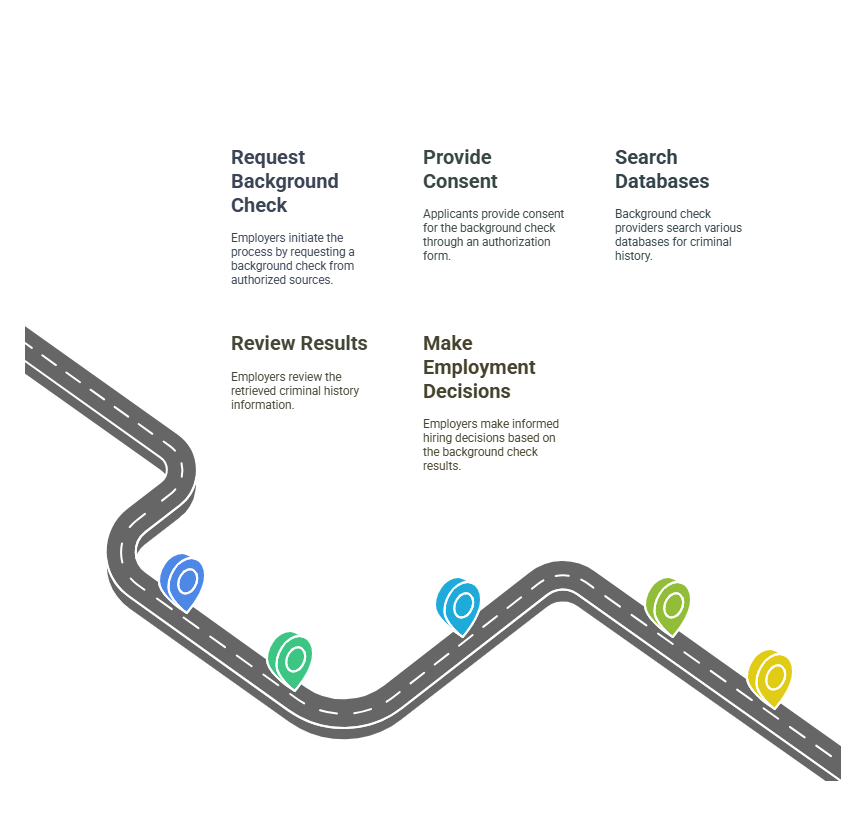
The process of conducting a criminal background check in Arizona involves several steps:
- Requesting the Background Check: Employers must request the criminal background check from an authorized source. This request can be made through various channels, including submitting an application to the Arizona Department of Public Safety (DPS), requesting an FBI report, or using a private background check provider. Some employers choose to use an online platform for ease and speed of processing.
- Providing Consent: Arizona law requires that the applicant or employee provide consent before a background check is conducted. This consent is typically given through an authorization form. Employers must also notify the individual if any adverse action (such as not being hired) will be taken based on the results of the criminal background check.
- Searching Databases: After consent is given, the background check provider will search through various databases, such as the ACJIS, federal databases, local court systems, and law enforcement records. The criminal background check may include information about convictions, arrests, and any other criminal activities recorded under the individual’s name.
- Reviewing the Results: Once the criminal history information is retrieved, the employer will review the results. Employers are required to consider the nature of the crimes, the time that has passed since the conviction, and the relevance of the criminal history to the job being applied for. Arizona law prohibits discrimination against applicants for certain types of criminal history, such as arrest records without convictions or convictions that have been expunged.
- Making Employment Decisions: The employer will then make an informed decision based on the results of the background check. If the individual has a criminal history, the employer will assess whether the offenses are relevant to the job position and whether the applicant has been rehabilitated. If a job offer is rescinded due to criminal history, the employer is required to provide the applicant with a notice of adverse action, explaining the reason for the decision.
Types of Information in a Criminal Background Check in Arizona
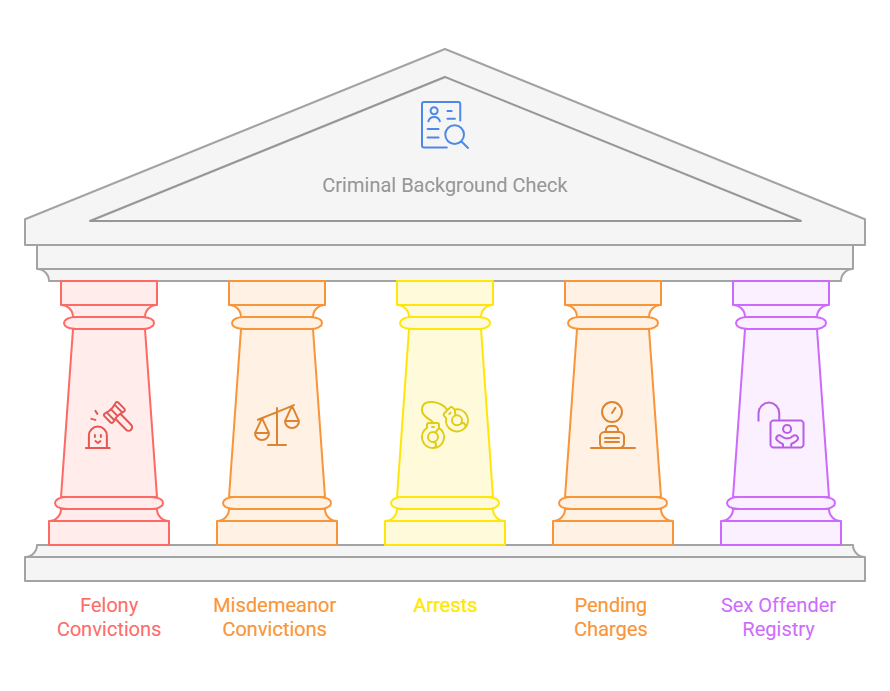
A criminal background check in Arizona generally includes the following information:
- Felony Convictions: Criminal offenses considered serious, such as theft, assault, or drug trafficking. Felony convictions can have a lasting impact on a person’s ability to obtain certain jobs.
- Misdemeanor Convictions: Less severe crimes, such as shoplifting, minor drug possession, or public intoxication. Misdemeanors may still affect employment, particularly for positions that require high levels of trust.
- Arrests: Record of arrests, even if charges were never filed or the case was dismissed. While arrests alone don’t indicate guilt, they may be noted on a background check and require clarification.
- Pending Charges: In some cases, an applicant’s background check may include information on charges that are still pending in the court system.
- Sex Offender Registry: Employers may check whether an individual is registered as a sex offender under both state and federal registries.
- Warrants and Probation Records: Warrants for arrest or probation status may be included, which could indicate an unresolved criminal matter.
- Expunged or Sealed Records: While certain records may be expunged or sealed, it’s important for employers to understand that the status of these records can vary depending on the case.
Why Are Criminal Background Checks Important in Arizona?
Criminal background checks are important for various reasons:
- Workplace Safety: By conducting background checks, employers can ensure that they are hiring individuals who do not pose a threat to the safety of others in the workplace.
- Regulatory Compliance: Many industries in Arizona are subject to strict regulations, especially those that deal with vulnerable populations or financial transactions. Criminal background checks help employers meet compliance requirements.
- Risk Management: Hiring individuals with criminal histories related to theft, violence, or fraud can expose companies to legal liabilities. Background checks minimize these risks.
- Trust and Integrity: Employers need to build trust with customers, clients, and partners. By conducting thorough background checks, they can ensure that their workforce maintains the highest standards of integrity.
Process, Benefits, and Best Practices for Criminal Background Checks in Arizona
Criminal background checks are a critical part of the hiring process in Arizona. They allow employers to make informed decisions about potential employees and reduce the risks associated with hiring individuals who may pose a threat to workplace safety, integrity, or overall company values. Understanding the process of conducting a criminal background check, the benefits it brings, and best practices ensures that employers comply with regulations while ensuring they are making sound decisions.
In this section, we will explore the process involved in obtaining and reviewing criminal background checks in Arizona, outline the benefits these checks offer, and discuss best practices for employers to follow. We will also mention Rapid Hire Solutions, which can support businesses in ensuring their background check processes are both efficient and compliant.
Step-by-Step Process for Conducting a Criminal Background Check in Arizona
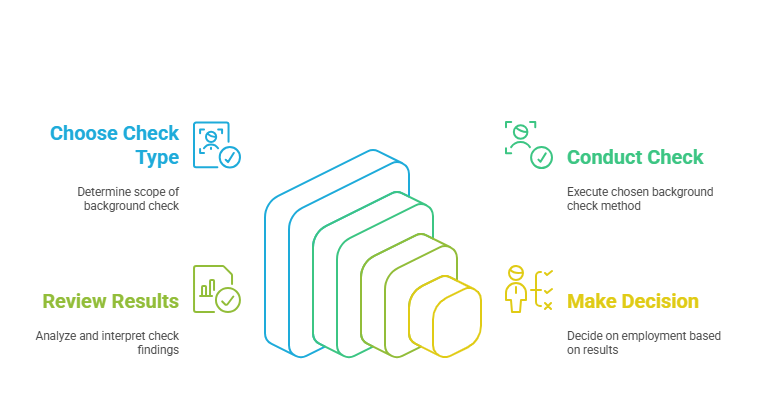
The process of conducting a criminal background check in Arizona follows a series of steps, ensuring that the employer receives accurate and up-to-date information. Employers need to understand the steps involved, the resources available, and how to navigate the system to obtain the necessary details for employment decisions.
1. Obtain Consent from the Applicant
The first step in the process is obtaining written consent from the applicant. According to the Fair Credit Reporting Act (FCRA) and Arizona law, employers must inform applicants that a criminal background check will be conducted as part of the hiring process. This consent ensures that the individual is aware of and agrees to the process.
Consent can be provided on a form specifically designed for this purpose, which clearly outlines the details of the background check. The applicant’s signature on the form signifies that they consent to a background check being performed and understand that the results may impact the hiring decision.
2. Choose the Type of Background Check
In Arizona, employers can choose between several types of background checks, each providing different levels of detail. Employers may choose to conduct a check that is limited to state records or one that includes both state and federal information.
- State-Level Criminal Background Check: This search is conducted through the Arizona Department of Public Safety (DPS) and includes criminal records maintained by state law enforcement agencies. This search typically focuses on felonies and misdemeanors that have occurred within the state.
- Federal Criminal Background Check: If employers need to conduct a comprehensive check, including offenses that have occurred outside of Arizona or on a national level, they can request a federal background check. This search includes nationwide criminal records maintained by the FBI and other federal agencies.
- County-Level Background Check: Local law enforcement agencies and courts maintain criminal records within specific counties. Employers may request background checks at the county level to search for offenses that have occurred in a particular county in Arizona.
3. Conduct the Background Check
After obtaining the necessary consent and determining the type of background check, the next step is to actually perform the check. Employers may conduct these checks in various ways:
- Through the Arizona Department of Public Safety (DPS): Employers can access the Arizona DPS’s criminal history records. This can be done either online or by submitting a request in person at the DPS office. The DPS provides a report that details criminal history information, including felony and misdemeanor convictions, arrest records, and case status.
- Via the Federal Bureau of Investigation (FBI): For nationwide checks, employers can request a criminal history report from the FBI. This involves submitting a fingerprint-based request through an authorized service provider or the FBI’s website.
- Third-Party Background Check Services: Many employers opt to use third-party background check providers that specialize in criminal history searches. These services often have access to state and federal databases and can deliver background checks more quickly. They may also offer additional services, such as employment verification, credit checks, and drug screening.
4. Review and Interpret the Results
Once the background check results are obtained, employers need to review and interpret the information carefully. It’s important to understand that not all information in a criminal record is relevant for making employment decisions. Employers should focus on the nature of the offenses, their relevance to the job position, and the time that has passed since the conviction. Arizona law mandates that employers cannot consider arrests that did not lead to convictions or convictions that have been sealed or expunged.
- Relevance of Offenses: Employers should consider the type of crime committed. For example, a conviction for theft may be relevant to a position involving financial responsibilities, while a traffic violation may not be.
- Time Passed Since Conviction: Employers should also consider how much time has passed since the conviction. Arizona allows individuals to have their criminal records sealed or expunged after a certain period, which can help job seekers with past convictions reintegrate into the workforce.
- Expunged or Sealed Records: In some cases, certain offenses may be expunged or sealed, meaning they are no longer visible to employers during a background check. Arizona law allows individuals to petition the court to have certain criminal records expunged or sealed after a set period, giving applicants a chance to move past their criminal history.
5. Make an Informed Decision
After reviewing the results, the employer must decide whether to proceed with the applicant’s employment based on the information in the criminal background check. Arizona law restricts employers from using criminal history as the sole determining factor in hiring decisions, and employers must ensure that their decisions are non-discriminatory.
If an employer decides not to hire someone due to their criminal record, they must follow specific steps, including providing the applicant with a notice of adverse action. This notice outlines the reasons why the employer is rejecting the application based on the results of the criminal background check.
Benefits of Criminal Background Checks in Arizona
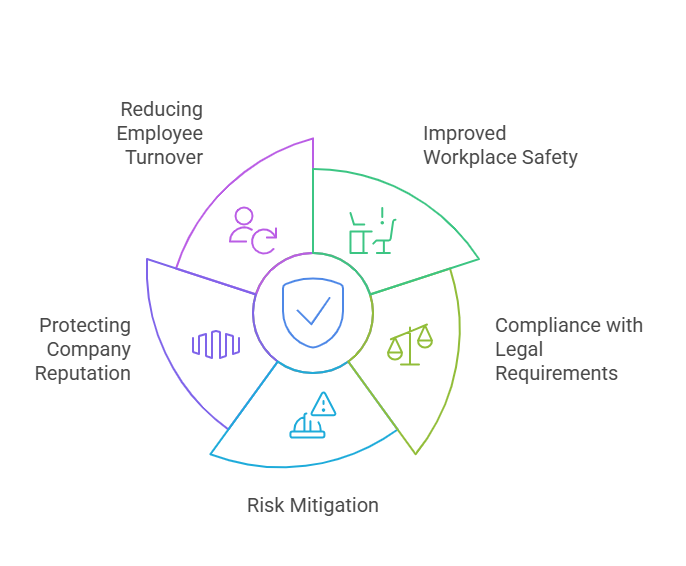
Criminal background checks offer numerous benefits for employers, helping them to minimize risk and ensure a safer and more compliant workplace. Some key benefits include:
1. Improved Workplace Safety
One of the primary reasons for conducting criminal background checks is to enhance workplace safety. By screening applicants for a criminal history, employers can avoid hiring individuals with violent tendencies, theft convictions, or a history of dishonesty. This is particularly important in industries like healthcare, finance, and childcare, where employees are entrusted with sensitive information or vulnerable populations.
2. Compliance with Legal Requirements
Employers in Arizona, especially those in regulated industries, must comply with state and federal regulations that require background checks. For example, healthcare facilities and schools are subject to laws that mandate criminal background checks for employees who work with children or vulnerable adults. Conducting thorough background checks helps employers stay in compliance with these regulations and avoid legal consequences.
3. Risk Mitigation
Hiring individuals with criminal histories could expose employers to potential legal liabilities, including lawsuits or claims of negligence if an incident occurs. By conducting background checks, employers can identify red flags before hiring and take proactive steps to mitigate potential risks.
4. Protecting Company Reputation
A company’s reputation is its most valuable asset. Hiring individuals with a history of criminal activity could harm a company’s brand image and damage relationships with clients, customers, and stakeholders. Criminal background checks allow employers to maintain a trusted and reputable workforce.
5. Reducing Employee Turnover
Hiring employees with a criminal history that directly affects their ability to perform their job duties can lead to high turnover rates. By performing background checks, employers are more likely to hire individuals who are reliable, trustworthy, and able to perform their job duties without issues. This reduces the risk of turnover and helps the organization maintain a stable workforce.
Best Practices for Criminal Background Checks in Arizona
Employers in Arizona should follow best practices when conducting criminal background checks to ensure compliance with the law and avoid common mistakes. Here are some key best practices:
- Get Consent in Writing: Always obtain written consent from the applicant before conducting a criminal background check. This is required by both Arizona state law and federal law.
- Ensure Compliance with Arizona and Federal Laws: Be sure to comply with all applicable laws, including the Fair Credit Reporting Act (FCRA) and Arizona-specific regulations regarding criminal background checks.
- Keep Records Confidential: Ensure that criminal background check results are kept confidential and only shared with authorized personnel involved in the hiring decision.
- Consider the Job Relevance: Evaluate the relevance of the criminal history to the job. Do not automatically disqualify candidates based on criminal records without considering the nature of the offense and its relevance to the position.
- Provide Notice of Adverse Action: If you decide not to hire someone based on their criminal background check, be sure to provide them with a notice of adverse action and an opportunity to dispute any inaccuracies.
Rapid Hire Solutions: A Reliable Partner for Background Check Services
For employers in Arizona, partnering with a trusted background check provider like Rapid Hire Solutions can streamline the process of conducting criminal background checks. Rapid Hire Solutions offers comprehensive screening services that include criminal background checks, drug testing, and employment verification. With an emphasis on compliance and efficiency, Rapid Hire Solutions helps employers make informed hiring decisions while adhering to legal requirements.
Legal Aspects, FAQs, and Conclusion
Understanding the legal framework surrounding criminal background checks is critical for both employers and job seekers in Arizona. In this section, we will explore the legal aspects of conducting criminal background checks, including key state and federal regulations. Additionally, we will answer frequently asked questions (FAQs) related to background checks and employment screening in Arizona. Finally, we will summarize the key takeaways and emphasize the importance of adhering to proper background check procedures for legal compliance and optimal hiring practices.
Legal Aspects of Criminal Background Checks in Arizona
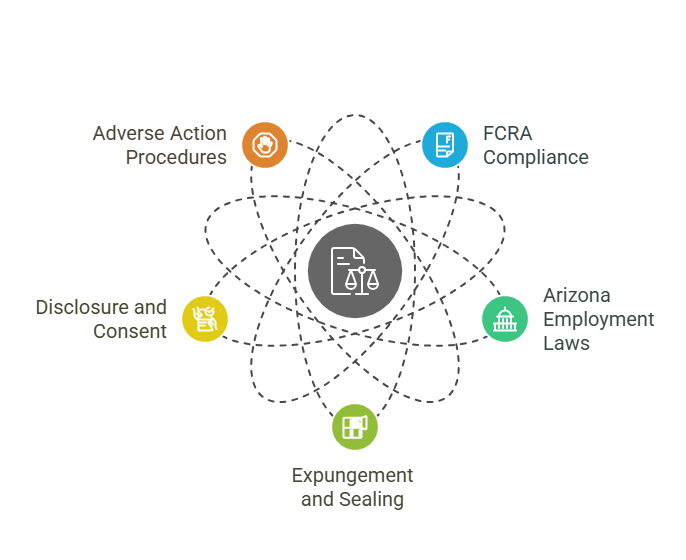
Criminal background checks in Arizona are subject to both state and federal regulations, and employers must ensure they are following these rules to avoid legal complications. These laws govern everything from the consent process to how information is handled and what can and cannot be used in making hiring decisions. Below are some of the most important legal considerations employers should be aware of:
1. The Fair Credit Reporting Act (FCRA)
The FCRA is a federal law that regulates the collection, dissemination, and use of consumer information, including criminal background check data. Employers must comply with the FCRA when conducting background checks, particularly when using third-party background check services.
Key requirements under the FCRA include:
- Disclosure and Consent: Employers must disclose to applicants that a background check will be conducted and obtain written consent. This disclosure must be a standalone document and cannot be combined with other job application materials.
- Adverse Action Procedures: If an employer decides not to hire a candidate based on information obtained from a criminal background check, they must follow the “adverse action” process, which includes notifying the candidate of the decision, providing them with a copy of the report, and allowing time for the candidate to dispute any inaccuracies.
- Accuracy and Fairness: Employers must ensure that the information they rely on is accurate. If there are any discrepancies or errors in the background check, the applicant has the right to challenge and correct those errors before the employer proceeds with their hiring decision.
2. Arizona’s Employment Background Check Laws
Arizona has its own set of laws that govern criminal background checks and employment screenings. Employers must be aware of how state laws interact with federal regulations to ensure they remain compliant.
- Arizona Public Records Law: Under Arizona’s public records law, certain criminal records are available to the public. However, there are limitations. For example, an individual’s criminal record can be sealed or expunged under certain circumstances, meaning it may not be accessible during a background check.
- Ban-the-Box Law: Arizona has adopted “ban-the-box” laws for state employers. This law prohibits employers from asking about an applicant’s criminal history on the initial job application. Criminal history can only be discussed after the employer has conducted an interview or extended a conditional offer of employment. This law aims to give individuals with criminal records a fair opportunity to be considered based on their qualifications before their criminal history is evaluated.
- Felony Disqualifications: Arizona law also prohibits employers in certain sectors (e.g., healthcare, education, and financial institutions) from hiring individuals with specific felony convictions. These industries often have more stringent background check requirements, especially for positions that involve handling vulnerable populations or sensitive information.
3. Expungement and Sealing of Criminal Records
In Arizona, individuals may have the opportunity to expunge or seal certain criminal records, which can affect the results of background checks. Expungement means that the criminal record is completely erased from public view, while sealing a record means it is hidden from public access, although law enforcement agencies can still view it.
The impact of sealed or expunged records on employment background checks can vary:
- Sealed Records: Employers conducting background checks will not typically see sealed records. However, certain types of employers (e.g., government agencies, law enforcement, and certain licensed professions) may still be able to access sealed records.
- Expunged Records: Once a record is expunged, it is erased from public access, and the individual is legally considered to have no criminal history in connection with that offense. Employers are not allowed to ask about or use expunged records in their hiring decisions.
Frequently Asked Questions (FAQs)
Below are answers to five frequently asked questions about criminal background checks and employment screening in Arizona.
How far back do criminal background checks go in Arizona?
In Arizona, criminal background checks typically go back as far as 7 to 10 years, depending on the type of check being conducted. State-level background checks may provide information about offenses that occurred within Arizona, while federal checks may look at crimes nationwide. Employers should be aware that certain types of offenses, like those that have been sealed or expunged, may not appear on the report, regardless of when they occurred.
Can an employer deny employment based on a criminal record in Arizona?
Yes, an employer in Arizona can deny employment based on a criminal record, but there are restrictions. Arizona law prohibits the blanket rejection of candidates based solely on criminal history. Employers must consider the nature of the offense, the time passed since the conviction, and whether the conviction is relevant to the job position. Additionally, employers must follow the Fair Credit Reporting Act’s procedures for adverse action if they decide not to hire an individual due to their criminal history.
Can someone challenge inaccuracies in a criminal background check in Arizona?
Yes, individuals can challenge inaccuracies in a criminal background check. If an applicant believes the information in their background check is incorrect, they can dispute the results with the background check provider. The provider is then required to investigate the dispute and correct any errors found. Employers are legally prohibited from taking adverse action based on inaccurate information and must allow the candidate the opportunity to correct the error.
Do I need to get a background check for all employees in Arizona?
In Arizona, employers are not required to conduct criminal background checks for all employees, but they are strongly encouraged to do so, particularly for positions that involve sensitive tasks, such as handling money, working with children, or managing confidential information. For some industries, background checks may be legally required (e.g., healthcare, education, financial services).
How long does it take to complete a criminal background check in Arizona?
The time it takes to complete a criminal background check in Arizona can vary depending on the type of check and the method used. A state-level background check typically takes 1 to 3 business days if conducted online. A federal background check or a background check that involves multiple jurisdictions may take longer, from several days to a few weeks. Using a third-party provider may expedite the process in some cases.
Conclusion
Criminal background checks are an essential part of the hiring process in Arizona. Employers who follow the proper procedures and comply with both state and federal regulations can significantly reduce the risks associated with hiring individuals who may pose a threat to the workplace. Additionally, ensuring that background checks are conducted fairly, accurately, and consistently can help employers avoid legal complications while maintaining a trustworthy and safe environment.
Employers are encouraged to understand the legal aspects of criminal background checks, including the role of expungement, the relevance of offenses, and the implications of Arizona’s “ban-the-box” laws. By adhering to best practices, employers can build a reliable, compliant hiring process that aligns with both legal requirements and organizational needs.
For businesses seeking assistance in navigating the complexities of criminal background checks, partnering with a reliable provider like Rapid Hire Solutions can streamline the process, ensuring that checks are completed efficiently and in full compliance with Arizona law.
